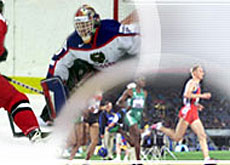Official backing for first global doping code

Sports organisations and governments from around the world have approved the first-ever global anti-doping code at a meeting in Denmark.
The blueprint sets out uniform drug-testing rules, procedures and sanctions to be applied across all sports and countries.
The centrepiece of the new code is a two-year sanction for a first, serious banned substances violation.
Step forward
“I think it’s a huge step forward,” Matthias Kamber, head of doping prevention at the Swiss Federal Office for Sport, told swissinfo.
“For the first time governments and private sports organisations are working together in a common effort.”
Kamber was among the 1,000 delegates (65 sports federations and 73 national governments) who had gathered in the Danish capital, Copenhagen, for the three-day conference that wrapped up on Wednesday.
The World Anti-Doping Agency (WADA) – which hosted the event – hailed the agreement as a “seminal moment” in the long campaign against performance-enhancing drugs in sport.
WADA was created in 1999 following the first anti-doping meeting that was held in Lausanne, Switzerland.
Proof
Sports bodies must adopt the code in time for the 2004 Summer Olympics in Athens.
The president of the Switzerland-based International Olympic Committee (IOC), Jacques Rogge, said that the real test would come when the code is put into practice.
“The proof of the pudding is in the eating,” Rogge said. “The future will tell us if this wonderful day can also be rated as a pivotal day in the fight against doping.”
Kamber agreed that the application of the protocol would be “crucial”, however he noted that the code would not by itself solve the existing problem.
“The code itself will not eradicate doping in sport but it will help to strengthen the common effort,” Kamber said.
Tough talk
There was tough talk from the IOC president, who threatened harsh punishment for those who failed to implement the new code.
Rogge said that sports bodies or countries which fail to comply with the anti-doping rules should be excluded from the Olympics.
“There should be no place in the Olympic Games for international federations or national Olympic committees who refuse to implement the code,” Rogge said.
Short cuts
Delegates admit that there will always be athletes who will try to circumvent the rules, no matter how tough, Kamber said.
But a new code at least puts WADA on the starting block.
“If you look at the code, it’s a very detailed document containing very strong sanctions and controls,” Kamber added.
Resistance
The issue of a fixed two-year sanction had threatened to derail the conference.
Some sports, including football, refused to accept two-year drug suspensions as mandated in the original code.
However, football’s world governing body, FIFA, and WADA reached a compromise during the summit.
“We have an agreement that the two-year sanction will be the norm, but not mandatory,” FIFA medical chief Michel D’Hooghe said.
The code allows for two-year suspensions to be reduced or waived if athletes can prove they were not at fault in the event of a positive test.
swissinfo, Samantha Tonkin
Key points of the first World Anti-Doping Code:
Athletes are responsible for any banned substance in their body.
An ani-doping violation during competition leads to automatic disqualification.
A first, serious violation will result in a two-year suspension.
Suspensions can be reduced or waived if athletes can prove that they were not at fault for the positive finding.

In compliance with the JTI standards
More: SWI swissinfo.ch certified by the Journalism Trust Initiative
You can find an overview of ongoing debates with our journalists here. Please join us!
If you want to start a conversation about a topic raised in this article or want to report factual errors, email us at english@swissinfo.ch.